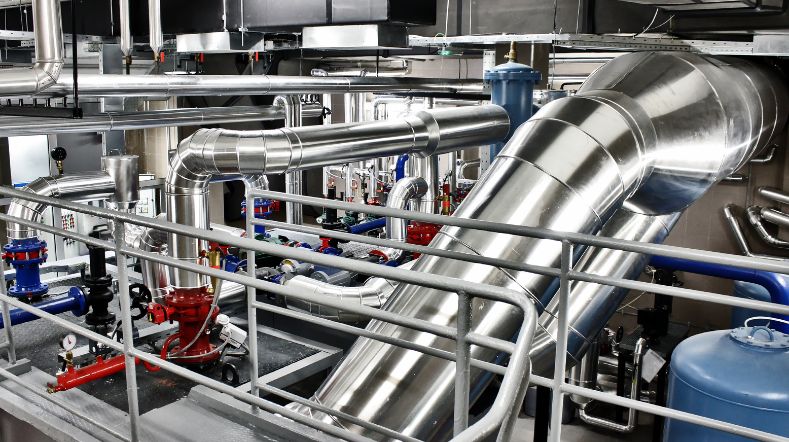Making business parks more sustainable
There’s great potential for improving the sustainability of business parks, where almost half of Dutch gas consumption and almost a third of electricity consumption in the Netherlands is concentrated. Making a business park more sustainable offers economic opportunities; has strong potential for energy solutions; and requires a collective approach.
At TNO, we develop knowledge and tools that provide insight into the sustainability potential of business parks. In doing so, we work with partners to develop innovative and scalable collective solutions, such as energy hubs, for making business parks more sustainable.
Enhancing sustainability and preventing grid congestion collectively
Business parks can play a major role in the energy transition. The grouping of many businesses on one site usually leads to a high, concentrated energy demand. As a result, there are entrepreneurs who have taken the lead in collaborating with each other to become more sustainable. Such collaborations make collective solutions promising. Indeed, expectations regarding electricity grid congestion in combination with the electrification of energy demand as well as the installation of renewable energy sources result in shared need to cooperate, use energy efficiently, and find additional space on the electricity grid.
CO2 reduction in business parks
Data from Statistics Netherlands (CBS) shows that in 2019, around 20 billion m3 of natural gas (626 petajoules of natural gas) and 39 billion kWh of electricity (140 PJ of electricity) were supplied to business parks from the national grid. That’s almost half of total gas consumption and almost a third of total electricity consumption in the Netherlands. Even without large-scale businesses, which often have a separate strategy, there are some 2.3 Mt of yearly CO2-emissions to be saved in business parks. This can be achieved with measures that already have a realistic time frame to recover the initial investment.
Monitor identifies potential for sustainable business parks
To gain more insight, obtain reliable and factual data, and identify the potential for making a business park more sustainable, TNO, in collaboration with the Netherlands Enterprise Agency (RVO), Statistics Netherlands (CBS), and the Land Registry and Mapping Agency (Kadaster), developed ‘The Sustainable Business Parks Monitor’, commissioned by the Ministry of the Interior and Kingdom Relations and the Ministry of Economic Affairs and Climate Policy. This enables them to set policy goals, monitor, develop policy instruments, and evaluate.
The Sustainable Business Parks Monitor provides a uniform, national open dataset for business parks, which can be used by public authorities, market players, and knowledge parties in making business parks more sustainable. The first version of the Monitor contains data on energy labels, energy consumption, carbon emissions, environmental category, surface area, and approved measures – for all business parks in the Netherlands. The Monitor will be expanded step by step with new datasets in the coming years.
More information:
Sustainable Business Parks Monitor
Take a look at the monitor and get an insight into the sustainability potential of your business park.
Five factors for success
The entrepreneurial and industrial character of business parks may provide a major impetus to the energy transition for companies and the surrounding area. In the quick-start guide drawn up by TNO, we identify 5 factors for success:
- A high degree of organisation: Is there already a business collective, such as a business association, committee, or park management?
- A formal and active (possibly non-profit) collectivity: Is there a collective entity of companies fully or prominently dedicated to sustainability, with a widely supported mission and vision?
- Professionalism: Are the right expertise and connecting and serving competences available for structural support of companies in the energy transition?
- Public-private partnership: Is there structural collaboration between the business community and public authorities?
- Access to capital: Is there access to capital under favourable conditions? For example, an energy fund, an entrepreneurial fund, or incentive schemes.
Want to get started yourself? Download the quick start guide (in Dutch).
From momentum to action
TNO is co-founder of the Sustainable Business Parks Programme (PVB). The programme helps business parks become more sustainable and starts with the first step: increasing the degree of organisation. How the sustainability of business parks can be accelerated is described in report prepared by TNO, the Transitiemakers, and the CLOK Foundation in the preliminary phase of the PVB.
Download the report (pdf) or read more about the PVB (both in Dutch).
Getting started with the right tools
TNO develops techno-economic calculation tooling that can be used by experts to make business parks more sustainable:
- A quick-scan of energy use and savings potential in business parks (the Energy Potential Scan, available in licence form)
- A quick-scan for the potential for flexibility in business parks (the Flexscan, in the pilot phase)
- Tooling for calculating energy scenarios and projects in business parks (ICE, in the pilot phase)
- Tooling for planning and designing energy hubs in business parks (under development within the EIGEN project).
Energy hubs can contribute to the integration of large-scale renewable energy generation, for example through electrification. This balances supply and demand for local energy and reduces pressure on the energy grid.
TNO develops governance structures and computational and business models for the development of energy hubs in business parks. Both in a Dutch and European context, for example in the MOOI EIGEN project and the Horizon Europe project REFORMERS.
Get inspired
Switching to a heat pump is financially attractive for 90% of single family homes


Cooling demand and space cooling: a growing concern in the energy transition

Technical catalogue based on Danish model to accelerate the roll-out of district heating networks


Heating and cooling solutions


Living without gas: drivers and barriers




